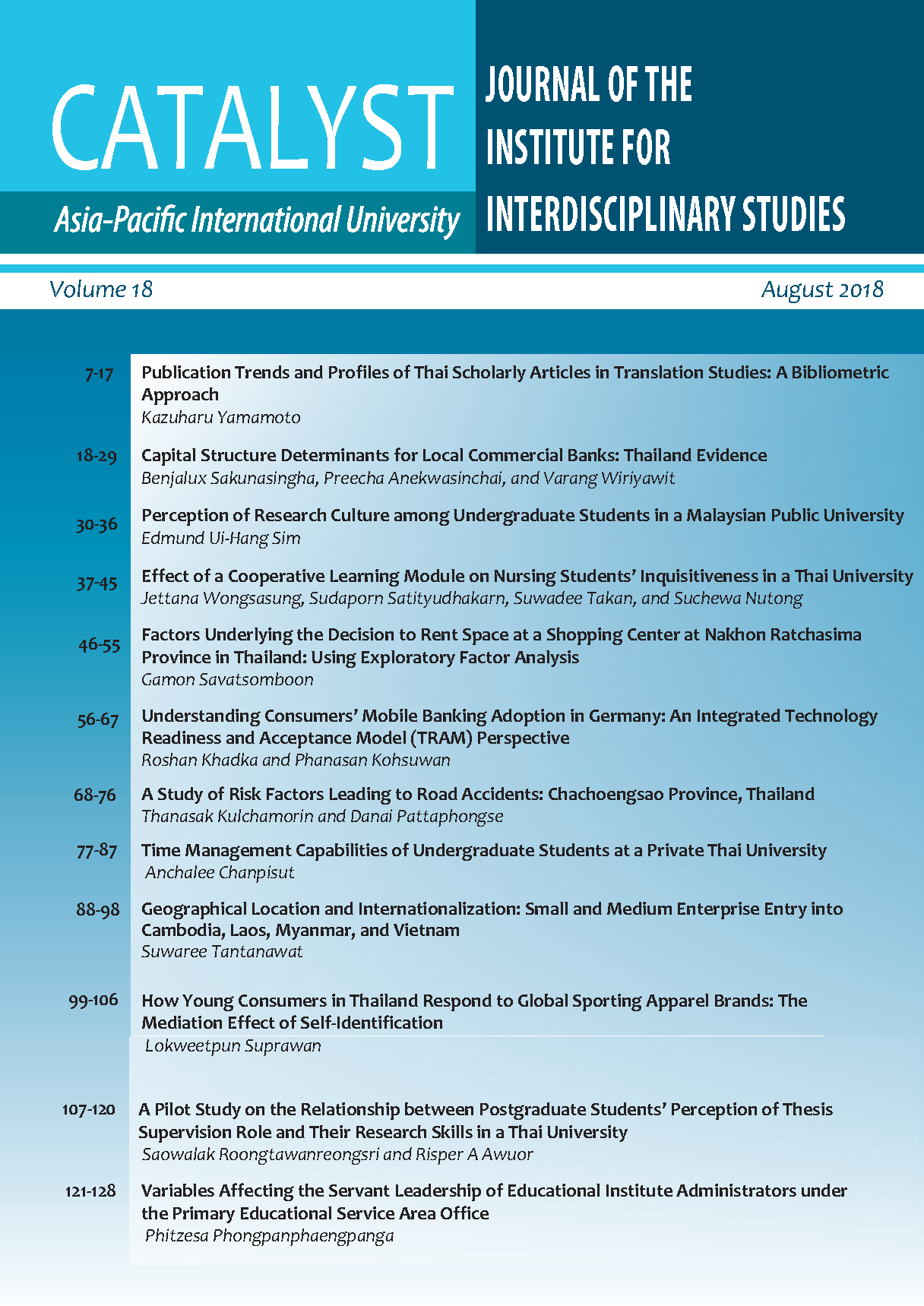Effect of a Cooperative Learning Module on Nursing Students' Inquisitiveness in a Thai University
Main Article Content
Abstract
The inquisitiveness of nursing students before and after implementation of a cooperative learning module was tested among a group (n = 40). An Inquisitive Questionnaire was developed with a Cronbach's alpha coefficient of 0.93. The process of attempting to raise inquisitiveness was accomplished by adoption of the Student Teams-Achievement Divisions teaching strategy. Involved was a group process emphasizing shared learning, rewards, and grades. The focus was also on learning together as a group that involved reviewing, explaining, delegating, working together, submitting their assignment, and being evaluated as a group. This process was applied to the intervention group for three days a week over two weeks. The inquisitiveness of students was assessed before and after the intervention by using the developed questionnaire. Results demonstrated that the inquiry level and inquisitiveness of students improved after receiving cooperative learning intervention. Significance was at the .05 level (t = 6.80, p < 0.05). Cooperative learning promotes inquisitive learning process development, and facilitates nursing practice in accordance with established objectives. Nurses become more knowledgeable and competent in nursing subjects, skillful in nursing practice, and successful in nursing careers.
Article Details

This work is licensed under a Creative Commons Attribution-NonCommercial-NoDerivatives 4.0 International License.
Copyright: Asia-Pacific International University reserve exclusive rights to publish, reproduce and distribute the manuscript and all contents therein.
References
Johnson, D., Johnson, R., and Holubec, E. (1994). The nuts and bolts of cooperative learning. Minnesota: Interaction Book Company.
Khammani, T. (2010). Art of teaching: Cognitive for learning process to be effective (13th Edition). Bangkok: Dansuthakarnpim.
Kunka, S., Phuriwitateera, K., & Phomput, P. (2013). Attitude of junior nursing student in the teaching–Learning by using media movie in nursing a person with mental problems subject. Ramathibodi Nursing Journal. 19(1), 102-113.
Maneechot, B. (1997). The relationships between participative instruction and inquiry behavior of nursing students. Master thesis, Mahidol University.
Mingsiritham, K. (2009). Development of A web-based learning model integrating cooperative learning and collaborative learning to enhance self-directed learning of pre-service teachers. Doctor of Philosophy dissertation, Chulalongkorn University.
Nelchaleaw, N. (2009). Effect of cooperative learning on scientific mind of grade level 3 students. Master thesis, Chiang Mai University.
Neuman, B. & Fawcett, J. (2011). The Neuman systems model (5th edition). Upper Saddle River, New Jersey: Pearson Education Inc.
Ponsalum, P., & Tephatsadin, W. (2000). The instructional system reform in high education: Undergraduate Learning Process Development (Research report). Bangkok: Ministry of University Affairs.
Satiman. A. (2007). The effects of online project-based learning activity model on self-directed learning and learning achievement of higher education student. Doctor of Education dissertation, Srinakharinwirot University.
Thongnuag, P. (2010). Effects of student centered teaching modules on learner knowledge and learner developments in pathophysiology subject among nursing students. Princess of Naradhiwas University Journal, 2(1) ,73-89.
Tipteangtea, C., Chujai, R., and Chamneang, M. (2000). Preparing inquiry learning behavior to the before and after by using problem based learning of nursing student. Boromarajonani College of Nursing Ratchaburi Journal 12 (2), 12-17.
Tulaphan, P. (2007). STAD Cooperative learning activity in teaching artificial flower making course, Chaehom Wittaya School, Lampang Province. Master of Education thesis, Chiang Mai University.


